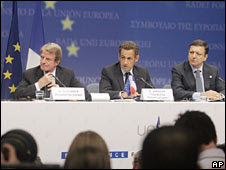Facts...........just the facts
Bush Has a Good Economic Record
By KEITH MARSDEN, Wall Street JournalRecent data published by the(IMF), the (OECD), the World Bank, the (ICP), and the U.S. Census Bureau allows a nonpartisan, factual assessment of the Bush economy. Here are some of the findings:
- Economic growth. U.S. output has expanded faster than in most advanced economies since 2000. President Bush will leave to his successor an economy 19% larger than the one he inherited from President Clinton. This U.S. expansion compares with 14% by France, 13% by Japan and just 8% by Italy and Germany over the same period. GDP per capita in the U.S. reached $41,813 (in purchasing power parity dollars) in 2005. This was a third higher than the United Kingdom's, 37% above Germany's and 38% more than Japan's.
- Health services. The U.S. spends easily the highest amount per capita ($6,657 in 2005) on health, more than double that in Britain. But because of private funding (55% of the total) the burden on the U.S. taxpayer (9.1% of GDP) is kept to similar levels as France and Germany. The U.S. Census Bureau reports that 84.7% of the U.S. population was covered by health insurance in 2007, an increase of 3.6 million people over 2006. The uninsured can receive treatment in hospitals at the expense of private insurance holders......average life expectancy in the U.S. rose to 78 years in 2006 (the same as Germany's), from 77 in 2000.
- Income and wealth distribution. The latest World Bank estimates show that the richest 20% of U.S. households had a 45.8% share of total income in 2000, similar to the levels in the U.K. (44.0%) and Israel (44.9%). In 65 other countries the richest quintile had a larger share than in the U.S.
- Employment. The latest OECD figures show a rate of 71.7% in 2006. This was more than five percentage points above the average for the euro area. The U.S. unemployment rate averaged 4.7% from 2001-2007. This compares with a 5.2% average rate during President Clinton's term of office, and is well below the euro zone average of 8.3% since 2000.
- Debt interest payments. The IMF reports that the interest cost of servicing general government debt in the U.S. has averaged 2.0% of GDP annually from 2001-2008, compared with 2.7% in the euro zone. It averaged 3.2% annually when President Clinton was in office. The cost of the wars in Iraq and Afghanistan has been largely absorbed in a relatively small increase in the defense budget (to 4.1% of GDP in 2006 from 3.8% in 1995). A much higher proportion of U.S. income was devoted to the military during World War II and the Korean War. MORE












